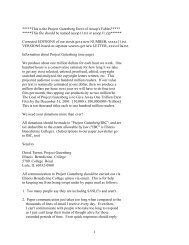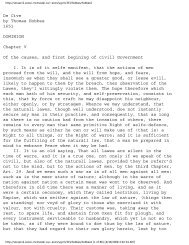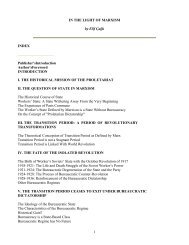Project Gutenberg Etext of The Large Catechism, by Martin Luther
Project Gutenberg Etext of The Large Catechism, by Martin Luther
Project Gutenberg Etext of The Large Catechism, by Martin Luther
Create successful ePaper yourself
Turn your PDF publications into a flip-book with our unique Google optimized e-Paper software.
only evil and harm, and nevertheless does not sin against God's<br />
commandment, because God has on His own account instituted that <strong>of</strong>fice;<br />
for He has reserved punishment for His own good pleasure, as He<br />
threatens in the First Commandment, -- just so also, although no one<br />
has a right in his own person to judge and condemn anybody, yet if they<br />
to whose <strong>of</strong>fice it belongs fail to do it, they sin as well as he who<br />
would do so <strong>of</strong> his own accord, without such <strong>of</strong>fice. For here necessity<br />
requires one to speak <strong>of</strong> the evil, to prefer charges, to investigate<br />
and testify; and it is not different from the case <strong>of</strong> a physician who<br />
is sometimes compelled to examine and handle the patient whom he is to<br />
cure in secret parts. Just so governments, father and mother, brothers<br />
and sisters, and other good friends, are under obligation to each other<br />
to reprove evil wherever it is needful and pr<strong>of</strong>itable.<br />
But the true way in this matter would be to observe the order<br />
according to the Gospel, Matt. 18, 15, where Christ says: If thy<br />
brother shall trespass against thee, go and tell him his fault between<br />
thee and him alone. Here you have a precious and excellent teaching for<br />
governing well the tongue, which is to be carefully observed against<br />
this detestable misuse. Let this, then, be your rule, that you do not<br />
too readily spread evil concerning your neighbor and slander him to<br />
others, but admonish him privately that he may amend [his life].<br />
Likewise, also, if some one report to you what this or that one has<br />
done, teach him, too, to go and admonish him personally if he have seen<br />
it himself; but if not, that he hold his tongue.<br />
<strong>The</strong> same you can learn also from the daily government <strong>of</strong> the<br />
household. For when the master <strong>of</strong> the house sees that the servant does<br />
not do what he ought, he admonishes him personally. But if he were so<br />
foolish as to let the servant sit at home, and went on the streets to<br />
complain <strong>of</strong> him to his neighbors, he would no doubt be told: "You fool,<br />
what does that concern us Why do you not tell it to him " Behold,<br />
that would be acting quite brotherly, so that the evil would be stayed,<br />
and your neighbor would retain his honor. As Christ also says in the<br />
same place: If he hear thee, thou host gained thy brother. <strong>The</strong>n you<br />
have done a great and excellent work; for do you think it is a little<br />
matter to gain a brother Let all monks and holy orders step forth,<br />
with all their works melted together into one mass, and see if they<br />
can boast that they have gained a brother.<br />
Further, Christ teaches: But if he will not hear thee, then take with<br />
thee one or two more, that in the mouth <strong>of</strong> two or three witnesses every<br />
word may be established. So he whom it concerns is always to be treated<br />
with personally, and not to be spoken <strong>of</strong> without his knowledge. But if<br />
that do not avail, then bring it publicly before the community, whether<br />
before the civil or the ecclesiastical tribunal. For then you do not<br />
53
















